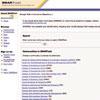news
Library offers archive opportunity, resources for faculty
Primary tabs
With more than 25,000 items in inventory, the SMARTech (Scholarly Materials and Research at Georgia Tech) digital institutional repository is the seventh largest institutional repository in the United States and 37th in the world.
The repository celebrates its fifth anniversary this year. The Library and Information Center is conducting a campaign on two fronts, according to Julie Speer, head of Scholarly Communication and Digital Services. Her department is working to collect and archive scholarly materials and research produced by Tech faculty and to digitize hard copies for archiving, as well as to inform faculty members that the library's archival services are available.
"SMARTech increases the visibility of faculty members' research," Speer said. "It's open to the world."
Speer's department is in the process of directing the digital archiving of past students' dissertations and master's theses. Begun in 2006, the project should be complete by the end of the fall semester, Speer says. "Students have been submitting [them] electronically since 2003."
The library seeks to collect more of the Institute's intellectual output-data, video, conference proceedings-"anything faculty members wish to archive," she said. "Our concern is that much of these items are sitting on personal computers." And, Speer says, the Library offers more services than just archiving. Prior to publication on SMARTech, the Library provides its own copyright research.
"We'll archive CVs [curriculum vitae] and we'll research copyrights to ensure publishers will allow articles to be published," said Tyler Walters, associate director for Technology and Resource Services.
Any objects able to be archived-from annual reports and conference papers to research reports and white papers-are accepted by the repository. "It can be a resource for all papers and research of a faculty member," Speer said. "Because of its ease of use, the repository can better enable them to work with other faculty in the same discipline or in a collaborative capacity." SMARTech contains fixed URLs, providing a permanent link to sources.
According to Speer and Walters, the Library provides support to researchers and their disciplines who adhere to open access policies. Walters says that advocating open-access practices can be a challenge in a research university. "Some disciplines are more open to sharing, while some prefer to be more restrictive." Speer says the repository has content from all the colleges. "We would love to have more faculty participation at the individual level. We want to help faculty with creating and storing information."
For fiscal years 2008 and 2009, the repository logged 46 million views and downloads. The repository is indexed by Google and Google Scholar. Faculty are encouraged to submit their materials through SMARTech. Speer says there is no backlog, as her team works to upload items as quickly as possible.
SMARTech is just one of the services offered, as detailed on the EPAGE@Tech (Electronic Publishing at Georgia Tech) Web site. Library staff also will produce video and audio recordings of lectures and symposia, provide electronic journal support and help understand the National Institutes of Health Public Access Policy. Walters says the Library does not record classes, but will handle scholarly lectures and symposia, with more than 200 lectures recorded. Each of these in turn is loaded into SMARTech.
"For researchers holding conferences or editing journals, we offer software and Web site services," Speer said. "We can help faculty transition from a print journal to an electronic journal. We have supported more than five or six conferences a year, and we help produce three journals on campus. We support the undergraduate journal The Tower, and help support and produce faculty members' open access journals."
Tech belongs to the MetaArchiveCooperative, which is funded by grants from the Library of Congress and National Archives. "We network with roughly 14 different universities, each with a 'network node,'" said Walters, a co-principal investigator on the grants.
"Everything preserved from each university's repository is stored on each node. When one is updated, all are updated." The Cooperative started in the Southeast, Walters said. It includes Tech, Emory University, Rice University, Boston College and PUC of Rio de Janeiro. "The servers are growing every week," he said.
Other resources include aiding authors in retaining their copyrights. These services are presented in more detail on the EPAGE@Tech Web site.
Groups
Status
- Workflow Status:Published
- Created By:Robert Nesmith
- Created:09/24/2009
- Modified By:Fletcher Moore
- Modified:10/07/2016
Categories

